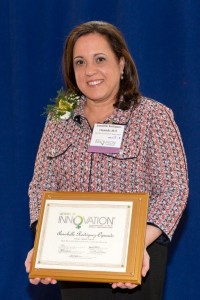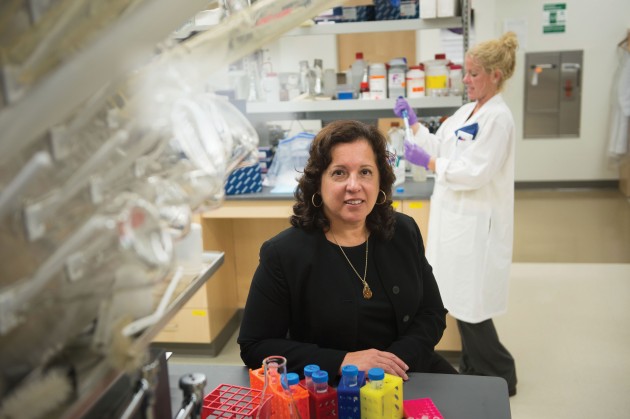Dr. Annabelle Rodriguez-Oquendo, whose research has led to two patents and a startup company that is developing a drug that could help millions with particular genetic variations, is this year’s winner of the Connecticut Technology Council’s Women of Innovation Award for Research Innovation and Leadership.
It’s the third time in the 12-year history of the Women of Innovation Awards that a member of the UConn Health faculty has been so honored.

“Science is a lot about how you see the world, and it’s exciting to be able to make other people see it that way, to be listened to, respected, and validated,” Rodriquez says. “Sometimes as you’re toiling at this, you’re in your own head. It’s nice to get external validation, and it’s nice to be acknowledged in such a supportive environment.”
Rodriguez, professor of cell biology and the Linda and David Roth Chair for Cardiovascular Research in the Center for Vascular Biology, is the first from UConn Health to win in the research category.
Associate professor of reconstructive sciences Liisa Kuhn won in 2009, and Dr. Marja Hurley, director of the Health Career Opportunities Programs, won in 2010, both in the category of Academic Innovation and Leadership.
It was Hurley who nominated Rodriguez.
“Dr. Rodriguez has identified variations of a particular gene associated with heart disease and female infertility, even in those with historically healthy HDL (‘good cholesterol’) levels,” Hurley wrote in her nomination. “Backed by federal grants and philanthropy, Dr. Rodriguez translated these discoveries into two patents leading to the ability to perform genetic testing. Additionally, her startup, Lipid Genomics, is part of the UConn Technology Incubation Program and is developing an investigational drug for those with the genetic variations described here. It is estimated more than 117 million people in the U.S. could benefit from this drug.”
Rodriguez says what was most impressive to her about the Women of Innovation Award experience was the next generation of innovators she met at the April 6 ceremony.
“From high school students to as young as third grade, what struck me is how much confidence and enthusiasm they showed,” Rodriguez says. “And what’s interesting is, for these girls and young women, the difficulty women have had getting into science in years past doesn’t occur to them. They’re too young to see those historic barriers. They approach it like, ‘Sure, why not? Of course!’ It’s wonderful to see because it shows how far we’ve come. They don’t see their gender as a limitation. I like their sense of optimism. It’s very inspiring.”
An internationally known scientist in the field of lipidology and atherosclerosis at Johns Hopkins University, Rodriguez says she was drawn to UConn Health by Bioscience Connecticut, the state’s commitment to invest in biomedical research, precision medicine, and advances in health care.
“Connecticut is in the right place for advancing bioscience and leading the way,” Rodriguez says. “There was a presence in the room for what STEM and bioscience can deliver, how we can transform discovery into things that benefit the public. It was palpable.”
UConn Health had five faculty members among the more than 200 nominees for eight categories of this year’s Women of Innovation Awards.
Dr. Jane Grant-Kels, UConn Health dermatologist who recently retired as department chair, and Molecular Biology and Biophysics Chair Sandra Weller also were nominated in the research category, while Community Based Education Director Stacey Brown and Caroline Dealy from the Center for Regenerative Medicine and Skeletal Development were nominees in the academic category.



